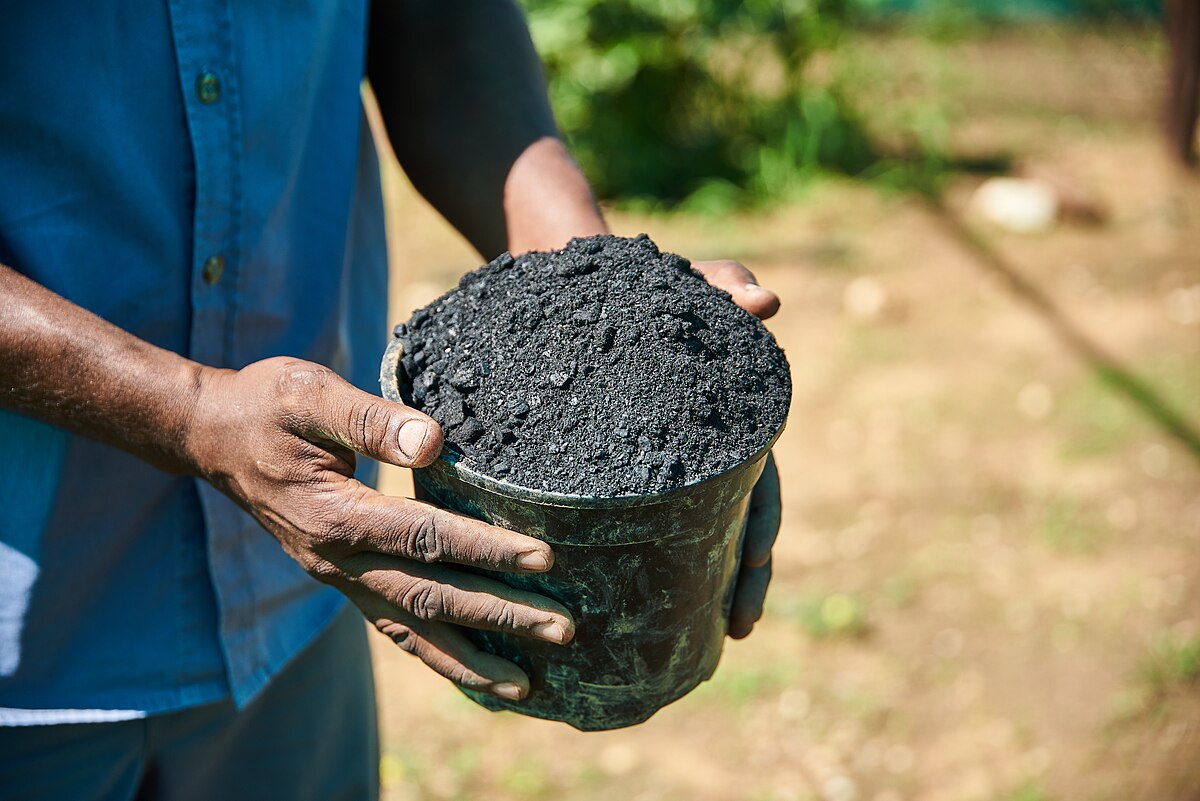Published Nov 17, 2024 | 2:16 PM ⚊ Updated Nov 17, 2024 | 2:20 PM

Unlike traditional charcoal used for fuel, biochar is primarily used as a soil amendment. (Wikimedia Commons)
In a significant move towards sustainable agriculture and environmental conservation, the Kerala government has constituted an expert committee to assess the potential of biochar — a carbon-rich product derived from organic materials — in the state.
The initiative follows a proposal by the Australia India Business Council (AIBC), dedicated to promoting bilateral trade and investment relationships between Australia and India. It highlighted the transformative possibilities of biochar in carbon sequestration especially in agriculture.
The seven-member committee will study the prospects of biochar including its export prospects.
The committee, chaired by the Special Officer for Agriculture (WTO Cell) Department, will include experts from the Kerala Agricultural University (KAU), the Central Plantation Crops Research Institute (CPCRI), and officials from the Agriculture Development and Farmers Welfare Department.
They will study the feasibility of producing biochar and its derivative products such as charcoal briquettes and activated charcoal, focusing on their domestic applications and export potential. The committee is expected to submit its report within three weeks.
The state government is of the view that the findings of the committee will be used for further discussions with AIBC.
Biochar is a stable, carbon-rich material produced by heating organic waste, such as agricultural residues, in a low-oxygen environment, a process known as pyrolysis.
Unlike traditional charcoal used for fuel, biochar is primarily used as a soil amendment.
When added to soil, it enhances fertility, improves water retention, and stores carbon making it a vital tool in combating climate change.
International Biochar Initiative described biochar as inexpensive, environment-friendly which can be used for a variety of purposes, such as soil remediation, waste management, greenhouse gas reduction, and energy production.
Several studies carried out across the globe point out to a range of benefits of biochar.
One such benefit is biochar locks carbon into the soil, preventing it from escaping into the atmosphere as CO2, a major greenhouse gas. This makes it an effective solution for mitigating climate change.
Another benefit is by enhancing soil structure and nutrient retention, biochar supports sustainable agricultural practices, especially in tropical regions like Kerala where soil degradation is a concern. Additionally, biochar’s porous structure helps soils retain water, making it particularly useful in areas prone to drought.
Agriculture Department officials said the initiative has a dual focus: Leveraging biochar for local agricultural improvements and exploring its export potential.
“Kerala, with its rich agricultural base and surplus organic residues, is well-positioned to become a hub for biochar production. The global market for biochar is expanding rapidly, driven by the demand for sustainable agriculture solutions and carbon credits,” an official told South First.
“Products such as activated charcoal, derived from biochar, are already in high demand internationally for use in water purification, air filtration, and industrial applications,” he added.
An official of the Directorate of Industries and Commerce termed biochar an untapped goldmine with immense potential across diverse sectors.
“From soil applications like viticulture and biochar-based fertilizers to non-soil innovations in concrete, textiles, and energy storage, the possibilities are vast,” the official said.
“Markets like Australia and New Zealand present significant opportunities, especially in animal feeds and sustainable practices. Additionally, the scope for biochar in combustion and as a fossil fuel alternative could redefine our green industrial future,” he added.
The officials said the AIBC took the lead in proposing this project, underscoring its innovative approach to sustainability and trade. Highlighting the same, it sent a letter on 15 July.
Following the letter, key stakeholders, including the Managing Director of Oil Palm India Limited, the Director of Agriculture Development and Farmers Welfare Department, and the Director of Research at Kerala Agricultural University, reviewed the council’s proposal. Their detailed reports emphasised the prospects of biochar in addressing environmental and agricultural challenges.
The Director of Agriculture Development and Farmers Welfare Department further suggested the formation of the expert committee to ensure a comprehensive study.
Dr. Anitha S, Professor and Head, Instructional Farm and Directorate of Seeds, KAU, provided insights into the importance of biochar in agriculture and why the state should adopt it.
“Biochar, derived from the pyrolysis of organic materials, is a decomposure-resistant soil amendment with immense potential to enhance soil fertility and boost agricultural productivity. Its long-term benefits include improved nutrient availability, increased pH, enhanced water retention capacity, and carbon sequestration for years,” Dr Anitha told South First.
She emphasised biochar’s ability to improve soil physical, chemical, and biological properties, making it particularly effective for highly weathered or degraded soils.
“The porous structure of biochar is key to its success, contributing to improved water retention and nutrient availability while enhancing microbial biomass carbon. These attributes can significantly enhance plant growth and crop productivity, benefiting both short-duration and long-duration crops, majorly the latter,” she added.
Dr Anitha pointed out that while biochar has been extensively studied and recognized as a sustainable technology, Kerala is yet to fully harness its potential.
“Although some farmers are using biochar, it is not widely adopted across the state. Given Kerala’s predominantly acidic soils, except in regions like Chittoor, biochar, being alkaline, can act as an excellent soil amendment,” she said.
She further said the KAU has been studying the application of biochar, besides encouraging its larger-scale use in farming.
“If adopted widely, biochar can serve as a game-changer in sustainable agriculture, enhancing soil health, mitigating greenhouse gas emissions, and ensuring long-term productivity,” Dr Anitha added.
(Edited by Majnu Babu).

